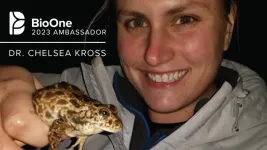(Press-News.org)
The study led by Professor Julie Henry from UQ’s School of Psychology looked at why self-directed ageism is common.
Cognitive changes make it difficult for older people to challenge internalised ageist beliefs.
Image: Adobe.
“Older people are regularly exposed to ageism such as negative assumptions about their worth, capacity or level of understanding, as well as jokes about older age,” Professor Henry said.
“At the same time, as we grow older, we rely more strongly on prior knowledge and cues from our environment to guide how we feel, think and behave.
“In a world that devalues ageing, these cognitive changes make it more difficult for older people to challenge internalised ageist beliefs, known as self-directed ageism.”
Self-directed ageism can present as self-doubt – ‘I'm too old to learn this new technology’ or ‘I’m too old to make new friends’ – and negative perceptions of one’s own aging, such as ‘I'm so much worse at this than I used to be’.
Self-directed ageism can also present as concern over being judged according to age-based stereotypes, such as ‘If I forget to do this, they're going to think it's because I'm old’.
Professor Henry said when ageism is internalised and becomes self-directed, it has been linked to a shorter lifespan, poorer physical and mental health, slower recovery from disability and cognitive decline.
“It can also be harmful when older adults allow their negative beliefs about ageing to undermine their confidence to take on new or challenging experiences and opportunities,” Professor Henry said.
“Interventions, such as creating more opportunities for positive social interactions between younger and older people, are needed to prevent negative views of ageing from developing in the first place.
“Our research also suggests that older adults will benefit directly from a reduction in cues to ageism in our wider social environment.
“If fewer ageist cues attract older people’s attention, the risk of self-directed ageism should be reduced.”
The paper is published in Trends in Cognitive Sciences.
END
Understanding self-directed ageism
Normal age-related changes in how we think, perceive and reason may increase the risk of older people viewing themselves through a negative and ageist lens, University of Queensland research suggests
2023-05-04
ELSE PRESS RELEASES FROM THIS DATE:
Amsterdam UMC leads an AI-powered hunt for high-risk vascular patients
2023-05-04
Every year 18 million people die from cardiovascular disease. Making it the deadliest disease in the world. Currently studies focus mainly on the heart, leaving the influence of vascular disease on these large numbers of deaths often out of sight. Despite vascular disorders being a trustworthy indicator for death from heart disease.
VASCUL-AID, a large European study led by Amsterdam UMC, will therefore focus on using AI to predict the worsening of vascular disease in people with an aortic aneurysm or peripheral ...
Chimpanzees combine calls to communicate new meaning
2023-05-04
Similar to humans, chimpanzees combine vocalizations into larger communicatively meaningful structures. UZH researchers suggest that this ability might be evolutionarily more ancient than previously thought.
A key feature of human language is our ability to combine words into larger compositional phrases i.e. where the meaning of the whole is related to the meaning of the parts. Where this ability came from or how it evolved, however, is less clear.
Chimpanzees, our closest-living relative, are known to produce a number of different vocalizations to manage their ...
In first in-utero brain surgery, doctors eliminated symptoms of dangerous condition
2023-05-04
Research Highlights:
Using ultrasound guidance, researchers successfully repaired a potentially deadly vascular malformation, called vein of Galen malformation, deep in the brain of a fetus before birth. The malformation, which has massively high blood flow, often leads to heart failure, severe brain injury or possibly death soon after birth.
The first in-utero embolization repair was successfully performed on a fetus at 34 weeks and 2 days gestational age. Fetal ultrasound showed an immediate drop in abnormal blood flow through the ...
Team performs first-of-its-kind, in-utero procedure to fix deadly vascular malformation
2023-05-04
In a first, a team from Brigham and Women’s Hospital and Boston Children’s Hospital successfully treated an aggressive vascular malformation in an infant’s brain before birth, avoiding potentially fatal symptoms after delivery.
Collaborating researchers and clinicians from Boston Children’s Hospital and Brigham and Women’s Hospital have prevented a deadly developmental condition by treating an aggressive vascular malformation in an infant’s brain before birth. The case, which is the first-ever, in-utero cerebrovascular surgery in the United States, ...
Indigenous people in South America are twice as likely to die from wildfires
2023-05-04
A new study, published in IOP Publishing’s journal Environmental Research: Health, reveals that Indigenous people in the Amazon Basin are twice as likely to die prematurely from smoke exposure due to wildfires than the broader South American population. Regions in Peru, Bolivia and Brazil are identified as particular hotspots for smoke exposure, with mortality rates rising to as high as 6 times that of the general population.
The results show that smoke from wildfires in South America account for approximately 12,000 premature deaths every year from 2014 to 2019, with ...
Restricting flavored e-cigarettes may reduce their use among teens and young adults: Study
2023-05-04
PISCATAWAY, NJ—Getting many adolescents and young adults to stop using e-cigarettes may be as simple as doing away with flavored versions of the product, according to new research in the Journal of Studies on Alcohol and Drugs. This study suggests that a large majority of current users may discontinue their use if the product became available in the tobacco version only.
“The restriction of the availability for certain e-cigarette e-liquid flavors has been considered by various regulatory ...
Alumna named BioOne Ambassador for doctoral work in biological sciences
2023-05-04
Chelsea Kross, a University of Arkansas alumna in biological sciences, earned a 2023 BioOne Ambassador award for her submission “Not all frogs can make it in the city: Using the landscape for targeted conservation,” which summarized research done while working toward her Ph.D.
The award recognizes early career researchers in biological, ecological and environmental sciences who demonstrate creative approaches to science communication.
“Communicating complex research is critically important to fostering public understanding and support for the sciences,” said Lauren Kane, president and CEO of BioOne. “The 2023 BioOne ...
Remote aerobic walking exercise training feasible for improving cognitive processing speed in persons with multiple sclerosis
2023-05-04
East Hanover, NJ. May 3, 2023 – Results of a pilot study funded by Kessler Foundation showed that remote aerobic walking exercise training is a feasible and highly promising method for improving cognitive processing speed impairment in fully ambulatory persons with multiple sclerosis (MS). The findings of this single-blind randomized control trial support the design of a randomized, controlled trial in large sample of persons with MS
The study, titled "Feasibility of Remotely Delivered and Supported Aerobic Walking Exercise Training for Cognitive Processing Speed Impairment in Fully Ambulatory Persons with Multiple Sclerosis," (doi: ...
Offering genetic testing at the point of care may increase uptake
2023-05-04
Genetic testing for hereditary cancers, such as breast, colon, pancreatic, and ovarian cancer, helps at-risk individuals understand their familial risk for these diseases and make informed decisions about next steps in care. But fewer than 20 percent of at-risk patients utilize this testing, and even fewer engage in genetic counseling after referral, often due to clinical workflow challenges or barriers to care.
Amid national efforts to increase access to genetic testing, a new study led by a Boston University School of Public Health researcher has identified a streamlined approach in clinical settings that may help advance ...
Early life abuse may be linked to greater risk of adult premature death
2023-05-04
Physical and sexual abuse in childhood and adolescence could be associated with a greater risk of adult premature death (before age 70), finds research published by The BMJ today.
This study extends and refines the existing evidence in this area, and highlights the importance of providing trauma informed care for those who have experienced child abuse, say the researchers.
Early life abuse is a global public health issue because it substantially contributes to child death and a range of long term consequences during adulthood. However, the association of childhood or adolescent abuse with total and cause specific premature death during adulthood ...
LAST 30 PRESS RELEASES:
Husker researchers collaborate to explore fear of spiders
Mayo Clinic researchers discover hidden brain map that may improve epilepsy care
NYCST announces Round 2 Awards for space technology projects
How the Dobbs decision and abortion restrictions changed where medical students apply to residency programs
Microwave frying can help lower oil content for healthier French fries
In MS, wearable sensors may help identify people at risk of worsening disability
Study: Football associated with nearly one in five brain injuries in youth sports
Machine-learning immune-system analysis study may hold clues to personalized medicine
A promising potential therapeutic strategy for Rett syndrome
How time changes impact public sentiment in the U.S.
Analysis of charred food in pot reveals that prehistoric Europeans had surprisingly complex cuisines
As a whole, LGB+ workers in the NHS do not experience pay gaps compared to their heterosexual colleagues
How cocaine rewires the brain to drive relapse
Mosquito monitoring through sound - implications for AI species recognition
UCLA researchers engineer CAR-T cells to target hard-to-treat solid tumors
New study reveals asynchronous land–ocean responses to ancient ocean anoxia
Ctenophore research points to earlier origins of brain-like structures
Tibet ASγ experiment sheds new light on cosmic rays acceleration and propagation in Milky Way
AI-based liquid biopsy may detect liver fibrosis, cirrhosis and chronic disease signals
Hope for Rett syndrome: New research may unlock treatment pathway for rare disorder with no cure
How some skills become second nature
SFU study sheds light on clotting risks for female astronauts
UC Irvine chemists shed light on how age-related cataracts may begin
Machine learning reveals Raman signatures of liquid-like ion conduction in solid electrolytes
Children’s Hospital of Philadelphia researchers emphasize benefits and risks of generative AI at different stages of childhood development
Why conversation is more like a dance than an exchange of words
With Evo 2, AI can model and design the genetic code for all domains of life
Discovery of why only some early tumors survive could help catch and treat cancer at very earliest stages
Study reveals how gut bacteria and diet can reprogram fat to burn more energy
Mayo Clinic researchers link Parkinson's-related protein to faster Alzheimer's progression in women
[Press-News.org] Understanding self-directed ageismNormal age-related changes in how we think, perceive and reason may increase the risk of older people viewing themselves through a negative and ageist lens, University of Queensland research suggests




